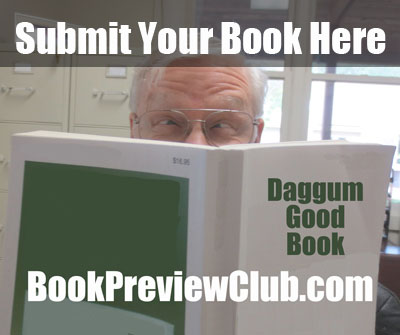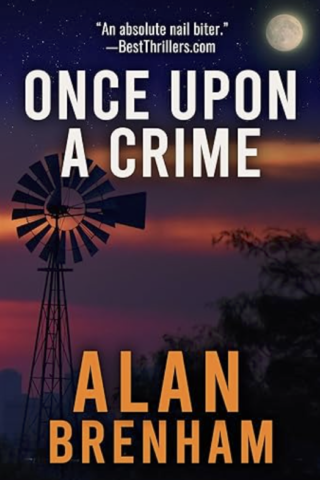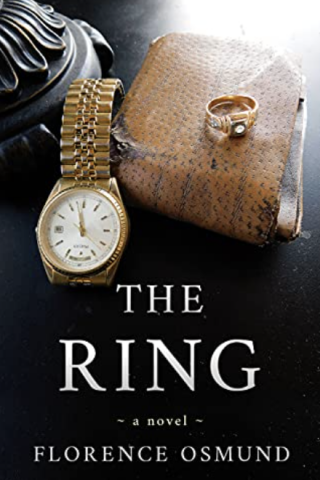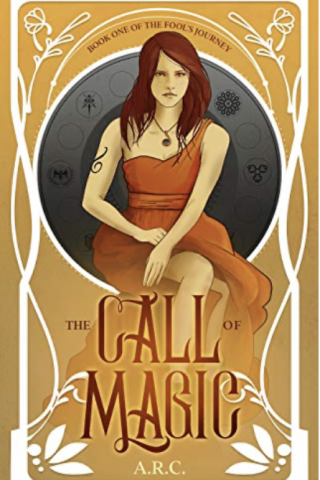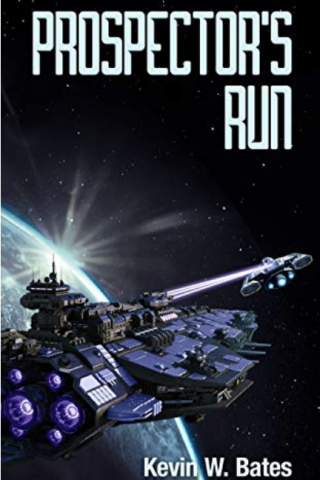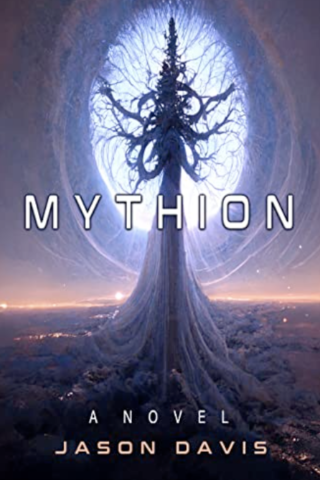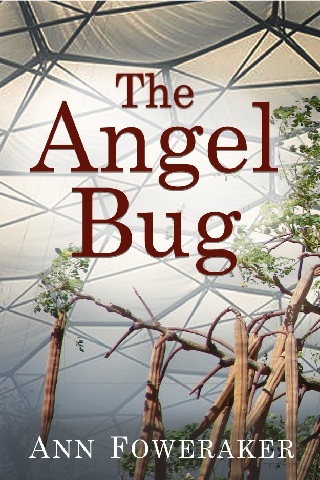
Description:
‘These memoirs may be the only evidence left of what really happened, where it came from and how it spread.’
When Gabbi Johnston, a quiet, fifty-something botanist at Eden, was shown the unusual red leaves on the Moringa tree, she had no idea what was wrong. What she did know was that the legendary Dr Luke Adamson was arriving soon – and that he would insist on investigating it.
This is the unassuming start to a maelstrom of discovery and change – with Gabbi swept up in it. What starts out as an accident turns into something illicit, clandestine and unethical – but is it, as Adamson claims, really all for the best?
‘The Angel Bug’, Ann Foweraker’s fourth novel, is set at the Eden Project in Cornwall, UK. This is a contemporary novel combining science fact and fiction, told by the people at the heart of the discovery.
e x c e r p t
[Web-Dorado_Zoom]
The Angel Bug
The Angel Bug – Copyright © 2013 by Ann Foweraker
All rights reserved. This book or any portion thereof may not be reproduced or used in any manner whatsoever without the express written permission of the publisher except for the use of brief quotations in a book review.
All characters in this publication are entirely fictitious and any resemblance to real persons, living or dead is purely coincidental – except for Sir Tim Smit, who has kindly given me his permission to be himself in this novel. Other than Eden (where I have taken liberties with the layout of service buildings and where the fictional procedure and personnel structures are all my own) no organisations are real or represent real organisations in Cornwall or elsewhere.
First published 2013
by Pendown Publishing
Cornwall, United Kingdom
Paperback version ISBN 978-1909936010
The Angel Bug
Gabbi Luke
1 18th October 2 18th -19th Oct
3 19th October4 19th October
5 20th October6 20th October
7 20th October8 21st – 22nd Oct
9 22nd October10 22nd – 23rd Oct
11 22nd – 23rd Oct12 24th October
13 24th October14 24th – 25th Oct
15 25th October16 26th October
17 27th October18 27th October
19 27th October20 27th October
21 27th October22 27th – 28th Oct
23 28th October24 28th -29th Oct
25 29th October26 30th October
27 30th – 31st Oct28 1st – 2nd Nov
29 Nov – Dec30 Nov – Dec
31 Dec – Mar 32 Dec – Mar
33 March -Apr34 March – Dec
35 April – Jan 36 2023 (10yrs on)
37 2017 – 2043 (extracts)
38 Emma – October 2084 (blog post)
The Angel Bug 1
Gabbi – October 18th
Thirty years should change a man, I thought, but looking at the handsome face on the huge poster it didn’t look like it had done much to Luke Adamson’s features except, perhaps, make him look more rugged, a man to be taken seriously.
I hadn’t mentioned knowing him when it was first mooted that he might be able to fit the Eden Project into his UK trip; publicising his book and film, rumoured to have made him a millionaire already. ‘Jungala’ was a box-office phenomenon, though it started out as a serious film on ‘Man’s relationship with plants and the importance of preserving biodiversity’.
It shouldn’t have made it as a blockbuster movie, however, something happened in the filming; the ‘baddies’, a real threatening force, turned up and turned Luke into an Indiana Jones character. Added to that, in the three years it took to film, two major breakthroughs in treating terminal illnesses in man had been developed from extracts of plants hitherto only known and used by natives of the rainforests. With his superb on-screen presence, deep knowledge of his subject, film-star good looks and some excellent cutting, the serious ethno-botanical study became a mainstream ‘true-life’ film complete with soundtrack and an eco-song reminiscent of ‘Born Free’.
You see I knew all this, I’d read about it in the papers; his name, as always, drawing my eye and, despite my conscious thoughts, my interest, I’d even gone up to Plymouth to see the first screening. So why hadn’t I said anything to Mikaela when she was bubbling on about ‘how wonderful it would be’, and ‘what a coup it would be’, and ‘wasn’t he the most sexy scientist out there’? Well, I knew myself too well, I knew if I’d said anything that I’d have blushed, and then there would have been that kind teasing that they went in for in the Eden family, and I didn’t think I could cope with that, and they would have no idea that it would be difficult for me.
The Eden family, that’s how I felt about them all, a great bunch of people that easily became friends as they seemed to have, at their core, the same values. To me they had been a true life-line, welcoming me in and giving me both a focus in life and the gentle external framework I had needed to grow into a stronger person when my main support had been so suddenly cut away.
Well I’d had a month to get used to seeing his photo everywhere, even in my local Co-op, and now his visit was only a couple of days away. I wasn’t really worried, I told myself, even at university he’d been one of the ‘celebrities’ and I was definitely ‘one of the others’. He probably wouldn’t recognise or remember me, so it wouldn’t be anything to be fussed about, I told myself – again.
‘Gabbi!’ Mikaela called, waving me over as soon as I reached the open-plan office floor of the Foundation building. When I got close enough, Mikaela swung her chair round to face the others too, ‘Hey, listen – Luke Adamson’s emailed me. “So looking forward to seeing the eighth wonder of the world! I have heard so many good things about the Eden Project – and as it is the last date on my tour I intend to take a break and see a bit of Cornwall while I’m there. Recommendations welcome.” Wow, what do you think? What would a guy like that want to see?’
‘He’s American – anything older than 200 years should do the trick,’ cut in Andy from the plant pathology desk.
‘Cynic!’ Naomi muttered, her eye to a microscope.
‘He’s used to old buildings,’ I murmured, seeing him standing under the arch of King’s College, then, as Mikaela turned a puzzled face to me, I added quickly, ‘PhD at Cambridge.’
‘So he did!’ Mikaela turned back to Andy, ‘So, maestro?’
‘So, it had better be King Arthur then, Tintagel, um, some of the prehistoric stuff, Men-a-Tol,’ Andy offered, pushing himself back from his desk, ‘Coffee anyone?’ Heads were shaken, one hand up, Andy shambled off to fetch one for himself and one for Naomi.
‘You know I keep thinking this is his first UK visit, when it’s just his first visit to this part of the UK!’ Mikaela beamed brightly, ‘I’m sure we can find some really Cornish places to recommend to him, might even be able to escort him round a bit,’ she added with a twinkle in her eye.
I smiled at Mikaela’s enthusiasm and thought he’d probably be quite happy to be escorted by Mikaela. Twenty-eight, pretty, long-legged, blonde and shapely, Mikaela was the antithesis of the dowdy scientist, very much the sort of girl Luke used to go for, I thought, and the type who went for him back then. I didn’t suppose he’d changed in that respect either.
By mid-afternoon, truth be told, I was feeling a little drowsy as another restless night caught up with me and I was finding the rows of figures in front of me swimming. Somehow, while Eden was between senior botanists, I had ended up with the role, partly through an odd deference to me as the senior by age and, I believed, an acknowledgement of my organisational skills. I shook myself and, deciding on a restorative cup of tea, pushed my chair away from the desk. As I did so my phone rang, sliding the chair forward again I answered with a voice much brighter than I felt.
‘Hello, Gabbi Johnston.’
‘Gabbi! Josh here, I’m in H03. There’s something not right with the Moringa – I think you had better come and take a look.’
From the designation, H03, I pictured the slight, pale boy, Josh, standing by the Orang dan Kebun, the Malaysian house and garden area in the humid-tropics biome.
‘All right, Josh, I’ll be right down,’ I said already standing as I replaced the phone. A quick whiz down to the pit was probably the best antidote to the lethargy I was feeling anyway.
Picking up my mobile I headed out of the Foundation building, turned sharply and collected my bike. As a health and lifestyle statement and as a method of keeping fit I kept a bike at Eden for getting around. Easy on the trip down into the pit, as the site of the biomes was appropriately known to the employees of Eden, but a darn sight harder on the muscles on the way back up to the administration buildings on the rim.
I felt that sense of wonder and exhilaration that I always did as my pedal strokes brought me in sight of the Eden that everyone recognises from books, TV and adverts, the soap-bubble constructions piled against the sides of the once raw granite china-clay pit, then, as I neared, the panoply of the temperate zone, the largest, the ‘outdoor biome’. All of it looking both small and vast at the same time.
After walking briskly through the jungle conditions of the humid biome I was perspiring slightly by the time I reached H03 and there was Josh standing beside the Malaysian house, keeping out of the way of the visitors who were wandering, gawping upwards, stopping and bending to read notices, children dashing back and forth to drag parents on to the ‘thing’ they’d found, or trailing behind, tired and hot.
‘Hi!’ Josh said when I stood beside him. ‘You have to get to the higher side to see it.’
We walked with the crowd round the edge of the garden, but where the rest flowed onwards we stopped and stepped to the far side of the path.
Josh raised his hand and pointed to the top most leaves of the Moringa oleifera.
‘There!’ he said, ‘Earlier, when it was clouded over, I could see quite clearly that the top-most leaves are going red.’
The sky beyond the ETFE bubble biome structure was bright now, I shaded my eyes but I still couldn’t see the leaf colour properly; the higher delicate fronds were just dark silhouettes.
A family came and stood between us and the tree. The mother read from the guide in clear tones. ‘ “Moringa oleifera, also know as the Horseradish or Miracle tree, has edible leaves, beans, flowers and roots.” I wonder if it’s the roots that give it the Horseradish name. “Beside it stands the Neem tree known throughout the East as the world’s most useful tree, providing medicine, fuel and food.” Well that sounds impressive for one plant. ’
The family stood a moment or two looking the two slim trees up and down, the younger boy pointing out the bean-like seed pods. They moved on, the mother reading the next section as they walked.
‘I’m going higher,’ I said. ‘I can’t see well enough from here.’
Josh nodded assent and followed me as I turned and took a near vertical route up through the planting to get as high as possible.
Now I could see. Josh was right; there were a significant number of leaves turning red, as if for an early autumn. Yet these trees shouldn’t have an autumn, shouldn’t be changing colour.
‘What’s the watering like?’ I asked
‘Fine, checked that, no problems now or recorded.’
‘Hmm, okay, well we will need leaf samples anyway – so dehydration can be ruled out while we look for other baddies,’ I smiled. ‘Could you arrange that for me Josh?’
‘Sure, only one for you, or one to each?’ he said, meaning, a sample for the plant pathologist and one for the entomologist too.
‘Better make it one to each, thanks,’ I said frowning, ‘Better make them bio-safe and labelled urgent. Okay?’
‘Okay, no probs!’
No probs! Indeed! Big Probs!! I thought as I sweated the bike back up the slope. Perhaps I should have had a sample sent to Mikaela too. It might be easier than actually telling her that there was a problem with the Moringa. Of all the trees in all the biomes, why did it have to be that one? A paraphrased Bogart said in my head, if no other plant, Luke would certainly zero in on his pet, the tree that made his name in ethnobotany! Back at my desk I bashed Moringa oleifera into the Forestry-Compendium website to check out if it had any history of turning red, and what the cause might be.
Andy and Naomi were heralded by their voices, obviously in heated discussion, followed by their persons as they came up the central staircase into the light and airy office space.
‘But it could be Thrips Palmi,’ Andy was saying.
‘What, with the quarantine measures all in place? Besides it isn’t as if it came from some dodgy place.’
‘Well, Kew has been known to have its own problems with diseases and vectors.’
‘Do we have a new problem?’ I cut in.
‘W04, some die-back co-incidentally right beside the new introductions.’
‘Which were quarantined for three months as usual!’ Naomi retorted.
‘Anyhow, we’ll know soon, samples coming over pronto.’
‘Well we’re going to be busy then, I’ve asked for you to see some from the Moringa as soon as they come in. It’s a bit tricky, it’s the last tree we want to have a problem with just now,’
‘Why? Any time is bad for any of them isn’t it?’ Naomi said, shrugging.
‘Ah, but Luke Adamson’s coming and he’s sure to make a bee-line for it.’
‘Why’s that?’ Andy said as he sat down.
I looked at Andy and Naomi, both of them looked puzzled, and young all of a sudden. I smiled, ‘Well back when you two were in nursery school, Luke made his name with the first comprehensive ethnobotanical study of the Moringa.’
‘Oh dear!’ Andy pulled a mournful face, waggling his head in a mocking way.
‘Oh dear, indeed,’ I almost laughed, Andy, at least didn’t seem in awe of the superstar.
The three of us busied ourselves in the portacabin laboratory at Watering Lane, Eden’s nursery a few miles west of the main site, each wearing the standard kit, lab coat, latex gloves, and, when we were cutting, goggles.
‘So,’ I said firmly, looking up from my microscope, ‘it’s definitely not a dehydration problem, these cells are as turgid as we could wish for.’
‘And so far I have found no signs of microbacterial infection,’ added Andy. ‘So I’m going to culture some sections, especially of the red cells.’
‘You just do that!’ Naomi said to his back as he went into the second half of the lab.
‘Nothing?’ I asked, looking across to her. There was an atmosphere between them that I couldn’t quite put my finger on, though it might have just been the cross accusations over the source of the plant infections.
‘Nothing, certainly on this sample, I’m off to take a good look at that tree and the area, put down a few sticky pads to see what insect vectors I catch.’
‘Okay. I have to admit I’d rather we found something concrete before Adamson turns up.’
Naomi turned and gave me a quizzical look as she hung up her lab coat. ‘I don’t know why you’re worrying, Gabbi, that new senior botanist will be here tomorrow and she can talk herself out of any hang-ups Dr Adamson has about our trees.’
Naomi just about slammed the door behind her, leaving me wondering what had ruffled her feathers. There was something in the way that she had said ‘senior botanist’ that suggested that the new boss was a problem, but, as I had not been in on the day of the appointment I’d not met Dr. Ananias. I had heard that she had made an impact on all of them in different ways, some by her looks, some by her ‘air’ and some by her obvious intelligence, however, perhaps not all opinions were favourable. I recalled that Naomi had been unusually reticent at the time.
I turned the leaf over again; the under side was a definite red, not unlike many plants that have a red underside to reflect light back through to the chlorophyll-bearing leaf tissues. I began to wonder whether the Moringa had the ability to adopt this red pigment in reduced-light circumstances. After all the ETFE bubbles of the domes did not allow a hundred percent light through them, then add to that, the fact that many of the largest of the trees in the tropical biome had grown so fast, faster than had been expected, that they had already needed pruning to prevent them reaching the skin of the dome, and so they were cutting out even more light.
‘Hey, Andy,’ I called. ‘I’m going over to reception to see if I can chase up anything on Moringa and low light levels.’
‘Okay, catch you up later.’
I cleared and washed up, then hung up my lab gear and left the laboratory. I glanced up at the vast range of glasshouses that had brought on the bulk of the trees and plants needed to create Eden, and now continued that work, with the sideline of producing plants for sale in the shop. Reception was a building that looked, appropriately, like an overgrown garden shed. Inside, it had the appearance of belonging to a set of artistic hippies; six-foot butterflies hung lazily on fine threads from the ceiling, a foam rubber and papier-mâché tree wound itself around a central pillar, and collection boxes for all kinds of recyclable stuff were everywhere. The reception desk itself was little more than a bare board and unmanned as usual, yet above it hung the ubiquitous picture of Luke.
‘Hiya, Jim,’ I called as I circled round to a spare computer.
‘All right?’
‘Will be if we can sort out this blessed Moringa before he comes.’ I nodded to the picture.
‘Yeah, I heard you had a problem. Anything I can help with?’
Jim was one of those truly green-fingered horticulturalists that make you believe in such things; anything he touched grew.
‘Not unless you can tell me why these Moringa leaves should turn red with no obvious reason. I’m just looking up the likelihood of a change to utilise reflected light, though there was nothing in the Forestry guide’
‘No watering problems?’
‘Nope.’
‘Hmm, light sounds like a possibility then, and that guide’s not infallible. I’ll leave you to it,’ he added as he left the building.
Half an hour later Andy broke through the trance that I’d sunk into as I flicked from article to article dealing with plants that utilised the red underside of their leaves. There were no cases where Moringa had exhibited this pattern of adaptation and the only plants where the colour changed, as opposed to always being red, had a well documented histology that demonstrated that they were always ready and willing to change as soon as the light levels decreed it.
‘Ready to go back?’ he asked.
‘Yep, might as well, not getting anything useful here. Of course I might be on to a new research paper,’ I grinned. ‘The adaptation of Moringa to life under ETFE.’
Andy grinned back; he knew how little I wanted to do any such thing, even though progress in the scientific world was made just that way. I’d said often enough that I was so glad I didn’t have to jump through those hoops as I had no ambition now to be a botanical high-flyer. After all I’d seen at first-hand what it meant. James had been at the top of his field for decades and it had driven him to despair at times, especially when out ‘scrounging’ for research funds, yet it still amazed me when he threw it all in and retired at fifty, many of his colleagues were just getting into their stride at that age.
We were no further on when I left for home. I drove my mini quite sedately, there being no need to hurry home, and the twists and turns of the high-banked hedges and the road between them meant that being ready and able to stop within a few yards of spying another vehicle was a distinct advantage. My mind wasn’t on my driving however; it was still on the problem of the Moringa.
Within fifteen minutes I pulled into my own drive. The sight of the house, low-browed over heavy granite with the sea glinting in the distance, as always, gave me first that surge of joy, now followed by a tang of sorrow. Sometimes, like today, I thought about selling, but I truly doubted I’d find another that gave me that delight on seeing it and there would always be the sorrow of James’ absence wherever I lived. The house had been my choice anyway, that sort of thing not being of interest to James, he’d just asked that the place should have a good sized garden. The garden was now a bit of a problem to manage. It was getting on for an acre and James had only just about got his vegetable garden going and an enormous herbaceous border planted when he collapsed with a massive heart attack whilst digging.
While I unlocked the door and went straight through to the kitchen, automatically putting the kettle on and flicking the answerphone off, I allowed myself to think about James. So often I had to stop myself thinking about him when I was alone, as the pain seemed to overwhelm me too easily when I had nothing else to think about. At work I could allow myself to think of him, knowing that I would be shaken out of my reverie by something going on, someone talking to me.
I’d been with James for over thirty years, he’d just started his PhD in Botanical Science and I was a second year student in the same subject when we met. I was working in the labs he used for his studies, and we got talking. He wasn’t the tall, dark and dashing type, more the tall, intellectual and serious type, but above all he was a really good person; kind, helpful, generous with his time, honest and dedicated. As I got to know him I found that I not only admired him but missed his presence when he was not working in the labs.
It took him a couple of months to ask me out. I recalled with a small smile his later confession that he’d been trying to make himself ask me out for all of one of those months at least, terrified that this ‘exotic creature’, as he called me, would laugh at him. Little did he know at the time that I was as shy as they come, and had it not been for the fact that we could talk in a detached, professionally scientific way to each other I probably wouldn’t have spoken to him at all.
People said we made an interesting couple, he at over six foot, alabaster skin, blue eyes, auburn hair, and me, a foot shorter, with a mass of unruly ebony hair, slightly olive skin that tanned easily and dark almond-shaped eyes.
I poured my tea and wandered into the open-plan dining area; as I did so I caught sight of myself in the mirror and stepped closer. That ebony hair was now tempered with what would be a sprinkling of grey if I didn’t disguise it with a chestnut dye, giving my hair instant highlights, and was far more controlled and controllable than it used to be by being well cut and twisted back into a knot held fast by one of my collection of unusual clips. The skin still looked good all things considered, but there was no hiding the lines round the eyes, so called laughter lines. If only.
With a blush I suddenly realised I was looking at myself and wondering what Luke would see.
The Angel Bug 2
Luke October 18th – 19th
The Great Hall was packed, the front rows were loaded with the elite of the university but, as far as I could see, the rest of the audience were the well-heeled environmentally-conscious middle-classes that I’d grown used to over the month of the tour in Europe.
I was prepared, hell, I knew my script off pat so that I spoke without notes. The lecture was carefully tuned to keep the audience awake, smiling, nodding at the wisdom pieces, anxious where they needed to be and enthusing just at the point where the talk finished and the book signings began. I’d worked out what I wanted to say and then, ignoring the publisher’s suggestion to ‘just be yourself’, I’d turned to the guy who’d worked the script for the narration on the film, a guy who could work magic with words. It was well worth it. Every time I spoke the audience was spellbound.
The Dean was at the lectern, giving me the ‘big build up’, Cambridge-style, almost off-handedly, reminding the assembly that ‘our speaker this evening’ was also a product of their own hallowed halls. It made me think for a moment on the difference between countries. Back home at Harvard I’d had a much better introduction, and I’d not even attended that university. The Dean, turned hand outstretched – my cue – and with a smile I stepped out onto the stage. The Dean waited near the lectern, so I had to cross most of the stage to get to him. He shook my hand, faced the audience and, with a turn of his hand towards the lectern, left the stage.
So there I was at the lectern but with no notes to put down on it. I still stood there, just to start off, I told myself. I gripped both sides of the lectern like a drowning man clutching a plank; I couldn’t let go of the damned thing. My fingers felt slippery and I was suddenly aware that my heart was beating faster than normal. This was ridiculous – I’d given this talk so many times and to so many illustrious groups. I mentally shook myself, smiled at the audience and began.
‘Good evening,’ I coughed and then continued, ‘this evening I want to take you on a journey, a journey that will lead you to stand beside me in a fight to save one of the worlds most valuable resources…..’
I found myself rushing my words, and I kept returning to the damned lectern as if it really did hold a set of notes. A part of my mind, not occupied with delivering the speech, realised what was wrong; every other time I’d felt totally relaxed, the audience with me – this lot were not playing the game. In the first few rows there were many with pursed lips and raised eyebrows. For the first time the carefully planned script sounded too much like entertainment and not enough about the real issues and the concrete science behind it.
‘….. so this is where we come to, could it possibly be true, as the indigenous peoples believe, that the mother forest has everything to cure all man’s ills? That it is part of God’s care, if you will, to provide our redemption from all the ailments man is heir to? Our journey has demonstrated how we live only by the grace of plant life. Could it be that we may live even healthier, even longer, without pain or disability, if we can only understand the gifts that are provided? And here’s the bottom line. To understand such things, then we need to be able to find and test them. This takes time, time that is running out as six percent of the rainforest is destroyed every year, meaning that your cure for cancer, your cure for Alzheimer’s, your cure for infertility, your cure for arthritis, may be lost forever. Thank you.’
The applause started and grew; I gave a small bow and turned to leave the stage. There, hurrying onto the stage was the Dean, florid faced with hand outstretched. What the hell?
‘Wonderful, wonderful,’ the Dean pumped my hand and turned out towards the audience, the clapping dying quickly. Only then did he drop my hand. It was all I could do not to wipe the clamminess off onto his suit jacket.
‘I’m sure we were all fascinated by Dr Adamson’s talk, and I’m sure that some of you will have questions,’
I felt a flush of annoyance, it was explicit in the contract that there would be no question time, but I was trapped, and looking round I could see at least half a dozen of the audience indicated questions by a discretely half-raised hand. I smiled grimly and walked back to the lectern, the beaming Dean in tow.
I scraped up a decent answer for the first and second questions, and headed off the third as I could see I was going to screw it up if I tried to answer properly, the figures were just not there at my fingertips. Their questions were pointed and deeply scientific, in every posh-brit syllable I felt an underlying criticism of the popular appeal of the book and the film and it was unnerving. It had been a long time since I’d been dealing with the nuts and bolts of the work that they were asking about. The past four years had been spent either in the jungle, doing bits for the film, editing or writing the book.
The fourth question was not much better and I knew my answer did not carry the required scientific rigour. Ridiculously, I began to feel out of my depth, as if, out there, were my former professors scrutinising me and my work. Indeed, from the number of white and balding heads I could see they probably were sitting out there.
More hands were raised. At that point, feeling sick, I leant over towards the Dean and said just that. The Dean, all hesitant and bluff at the same time, waved both his hands at the same time as if to ward of a host of mosquitoes, and then patting the air, apologised that ‘Dr Adamson will not be able to answer any more questions this evening as he is feeling under-the-weather’. He added that he was ‘sure that Dr Adamson would be glad to discuss matters of interest tomorrow as he was staying for another day’. He turned to me, beaming and nodding, at which I found myself nodding back.
Next morning, I lay awake listening to the breathing of the young woman lying beside me. I’d not had such a disturbed night since I left the jungle. Was it just being back here at Cambridge or was it the debacle last night? Well it was a new day and as far as I was concerned I was not going to be available to discuss anything.
My departure from the hall had meant fewer book sales than were usual, according to Kayleigh, so it had hit my Rainforest Foundation, and for that I was annoyed with just about everybody who’d had anything to do with the set-up for the lecture. I was lying there blaming them all for how it went wrong, and that included the pretty airhead, Kayleigh, lying beside me.
I slid from bed finding the floor cool beneath my feet, and padded through to the bathroom. On my way back I grabbed a towel and wrapped it round my waist. A quick glance told me that Kayleigh was still asleep as I turned to stand at the un-curtained window, drinking in the ancient city as it came sleepily awake in a misty morning. After a few moments my perceptions shifted, the window replaced by a movie screen as memories came flooding through. God! They had been electrifying times. I felt my blood stir as I thought of those years.
I saw my first immature awareness of the place, soon subsumed into an overpowering urge to beat it and everyone else at their own game. This place was supposed to be the best in the world; then I would be the best in it, no matter how I achieved it. I felt a smile touch my lips as I thought of the non-academic goals I’d set myself. Every one of them achieved, well very nearly, even if I’d had an advantage over the competition in both looks and provenance.
Rowing had been a first love from my early days on the New Hampshire lakes and later at Johns Hopkins, but at Cambridge the competitive edge took me over. There weren’t many other scientists on the crews and I worked really hard to dispel the ‘weak scientist’ prejudice that some of the crew members had. It meant being harder and meaner than they were. Harder meant I’d trained twice as much, meaner meant that at the crucial team-choosing time I’d zeroed in on a guy who’d been hassling me from day one. If he wasn’t calling me a ‘Yank’ then it was the science thing or because my hair was long and blond. So when he’d called out ‘Hey Blondie, did you forget your handbag?’ I’d walked over, punched him out and then turned away. He’d come up fighting mad and launched himself at my back, whereupon I’d grabbed his arm and folded forward tipping him over my back to land flat on the floor at my feet, only I didn’t let go of the arm, feeling something give as his body cracked down. Others had caught up with us by then; I shook my hand free of his and stepped back. He clambered up but the rest of the team held him back, and plenty said he’d asked for it. The fractured wrist put him out of the running, and me firmly into a place on the winning team for that most prestigious of races – the Oxford and Cambridge boat race.
I had worked all hours on the first piece of ‘competitive’ work and still found time to sweet-talk and bed the girlfriend of my main rival. That was the way I found out about the progress he was making, and how I came to the conclusion I’d have to upset the other guy’s experiments somehow, as they were proving too successful. In the end it was nothing to get into the other lab at the end of the day and turn off a switch. It could have been anybody that turned off the wrong switch, easily done, and weeks of preparation and incubation were wrecked in a single night of cold. It was all I needed to get the edge to complete and write up my work successfully by the deadline, whereas my competitor struggled to get to the end of his experiments. I took the girlfriend too, for a time, not for long, just about the length of time it took her to find out about the others.
For intelligent women they weren’t that good at working out my game, and boy were they intelligent! Just chatting to them was an intellectual sparring match in itself, and remembering that sent a shiver through me. That Kayleigh had to go, a PA from the publishing house, supposedly organising my tour, she was attractive in just the way I liked, and fell readily into bed, but talking to her was like conversing with a TV guide. If it wasn’t on the TV, then she didn’t know anything about it. She seemed to live in a reality show and knew all about the goings on in the soaps almost before they did, but intellectual conversation, even about books or publishing, seemed completely beyond her.
‘Hey!’ I shouted close to her ear. ‘Are you going to get that useless head of yours off the pillow or what?’
‘What?’
‘Yeah, right, listen up, I’m not intending to hang around here to be quizzed. I want transport out booked, pronto, I’m out of here by ten at the latest.’
‘Oh right,’ she glanced at her watch. ‘I’ll just grab a shower.’
‘No! I want that transport arranged first – then you can do what you like because I’m going to do this last tour date on my own.’
‘But Luke,’ she started her voice almost a whine. ‘I’m coming too, aren’t I?’
‘Don’t you ever listen? No, I’m going alone. You were great. I was glad to know you, but this is it, goodbye. Got it?’
Kayleigh pulled the sheet up over her breasts, her eyes wide, shaking her head slightly. ‘Just like that? You cold bastard, just like that?’
I shrugged and started to pick out clothes to dress in, then realised she hadn’t moved. ‘Phone! Now!’ Kayleigh jumped and, still clutching the sheet to herself, wriggled across the bed to the phone.
‘Okay, Luke – er Dr Adamson? I’ve booked you a taxi, but where will you want to go, like, your flight to Newquay isn’t until tomorrow, and you were supposed to be a guest of the University until then.’
‘Screw that, can’t you get me down there today?’
‘Well, I don’t know – I’ll see, it might not be easy, being a small airport, and I don’t know how many flights there …’
I cut in ‘Find out then! And if it’s an okay then get the hotel booking moved up a day too.’
‘Sure, fine, right away.’
I was pacing the room, wondering if even going to this last venue was worth it and why on earth had I allowed myself to get worked up over nothing. It was this place. I’d had come out top in everything; academic, sport and personal ambitions were all met, yet I’d never felt accepted, and I realised that still bugged me.
The Angel Bug 3
Gabbi 19th October
One of those beautiful frosty mornings that make winter worthwhile greeted me as I drew back the curtains. The sun glinted off the sea and on myriads of hoarfrosted points in the garden, for a change I felt refreshed and ready to face the day. It was my usual half-day so, as I was going into help at the St Piran’s Society in the afternoon, I dressed for comfort rather than style. After a quick breakfast I set off for Eden aiming to get there early to make sure everything was tidy in preparation for the arrival of our new senior botanist.
The sun had not yet worked its way into the pit and the domes were in shadow but light suffused the top floor of the Foundation building as I climbed the central stairs, assuming that I was first in, as usual. Suddenly I realised there was someone there already, sensed or heard a movement, I didn’t know which. I gripped the handrail at the top of the stair and tried to identify the direction the sound came from, swinging all round to take a three-sixty degree sweep of the place. A woman suddenly threw open the door of the coffee lounge, I jumped, even though I’d guessed there was someone about.

